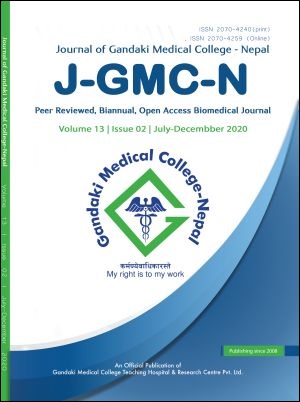Choices of Post-graduation Medical specialization among final year medical students, interns and medical officers working in different hospitals in Pokhara, Nepal
DOI:
https://doi.org/10.3126/jgmcn.v13i2.31034Keywords:
Medical speciality, career choices, PokharaAbstract
Background: The intricate decision to pursue finally one speciality following post bachelor’s medical degree is affected by many factors in Nepal. The aim of the study was to elucidate the preference of specialty among final year medical students, interns and medical officers currently working in Pokhara city of Nepal.
Methods: Observational cross-sectional survey, conducted from 1st Feb to 30th April, 2020. 127 participants including doctors working in private and government hospitals of Pokhara, Nepal. Structured questionnaire was prepared and distributed to participants. Data were entered, validated in Microsoft Excel 2017 and analyzed in SPSS, version 25. Chi-squared and t-tests were applied for categorical and continuous variables respectively to test the statistical significance at 95% confidence level.
Results: Of the total respondents, 30.46% reported clinical subjects as their preferences, followed by any clinical and basic subjects (20.31%). For clinical, Internal medicine was preferred by 15.6%, Surgery by 9.3%, Dermatology by 6.25%, Orthopedics by 4.68%, Pediatrics, Health care management, Psychiatry, Otorhinolaryngology, Gynecology and Ophthalmology were reported by 3.9%, 2.3%, 1.5% and rest 0.7%, respectively. 64% of the participants chose their speciality based on their keen interest, and while 17.9%, 12.5% and 3.1% closed due to pressure from family members, experience while working and anticipation of good quality of life respectively.
Conclusion: High proportion of the respondents’ preferred clinical speciality. Most opted clinical speciality was Internal Medicine. This may lead to saturation in those areas of specialization and as a result leave the population underserved in other important areas basic science involving clinical teaching and learning.
Downloads
Downloads
Published
How to Cite
Issue
Section
License
This license allows reusers to distribute, remix, adapt, and build upon the material in any medium or format for noncommercial purposes only, and only so long as attribution is given to the creator.

